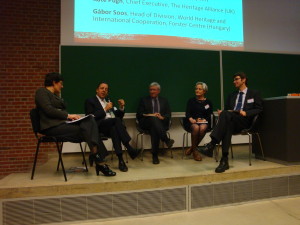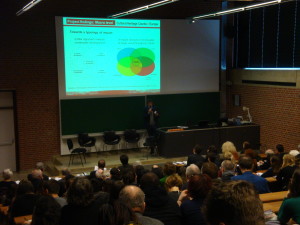
CHCFE discussion panel with representatives from the European Commission and European Parliament and heritage experts.
On 3 February in Leuven, Belgium, to launch the “Heritage Counts” international conference, CHCFE project leader, Europa Nostra, co-organised a panel discussion inviting EU representatives and heritage experts to discuss Europe’s heritage.
To set the context, the Cultural Heritage Counts for Europe project was presented by Koenraad Van Balen, Director of the Raymond Lemaire International for Conservation and Jacek Purchla, Director of the International Cultural Centre in Poland. Two case studies were also presented: “The Living Cabanyal Archive” by Elida Maiques, Member of the Cabanyal team, Valencia (Spain) – winner of a EU Prize for Cultural Heritage/Europa Nostra Award 2013 (category Education, Training and Awareness-Raising), and “The Westergasfabriek” by Liselore van der Heijden, Deputy Director, Amsterdam (the Netherlands) – winner of an EU Prize for Cultural Heritage/Europa Nostra Award 2010 (category Conservation).
The panel discussion, moderated by the Secretary General of Europa Nostra, Sneška Quaedvlieg-Mihailovic, included: Mircea Diaconu, Rapporteur of the European Parliament on the Resolution ‘Towards an integrated approach to cultural heritage for Europe’, Xavier Prats Monné, Director-General of the European Commission for Education and Culture, Kate Pugh, Chief Executive of The Heritage Alliance and a CHCFE project partner, and Gábor Soós, Head of Division of World Heritage and International Cooperation at the Gyula Forster National Centre for Cultural Heritage Management, Hungary.
The panel discussion highlighted the need for policy makers to have better access to information about the impact of cultural heritage in Europe, the need to mainstream cultural heritage, to create a platform for best practice and to ensure the preservation of knowledge by continuing to collect existing evidence (research, literature, case studies, etc.) on the multiple benefits of cultural heritage.
The “Heritage Counts” conference was organised by The Raymond Lemaire International Centre for Conservation (RLICC) and CHCFE project partner. This event brought together academics, researchers, heritage professionals and policy makers to discuss cultural heritage from different perspectives. The four-day agenda included more than 30 presentations about discourse, strategies, and case studies dealing with the economic, social, environmental and cultural impacts of cultural heritage were among the topics presented. Presenters came from all over Europe and as far away as China, Ecuador, Japan and the United States.

